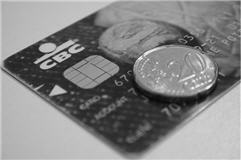 "Today, with all the usual pomp and circumstance, pride and prejudice," rumbled the university president, "we unveil our new, multi-million dollar investment: a chip-card system for student payments. Now students will have an easy and convenient way to purchase books and other items from our campus stores and vending machines and manage the balances on their student accounts."
"Today, with all the usual pomp and circumstance, pride and prejudice," rumbled the university president, "we unveil our new, multi-million dollar investment: a chip-card system for student payments. Now students will have an easy and convenient way to purchase books and other items from our campus stores and vending machines and manage the balances on their student accounts."
Patrick didn't really pay much attention to the round of announcements about the new system. Judging from the way the school was giving sessions and tutorials about the system, you'd imagine it required an advanced degree to use. In reality, it was little different from a standard debit card. The most cumbersome element was that you had to use a cashier at one of the campus stores to add money to the card.
"So, how do you think it works?" Patrick's friend Victor challenged him over drinks- purchased with old fashioned cash at the local pub, since campus-bucks only worked on campus. Speculation and analysis of the system was the current fad among CS majors- like all good nerds, they wanted to peek under the hood.
"I assume like a regular credit card, right?" Patrick shrugged. "It reads your account number off the chip and asks the server if you've got enough money."
Victor shook his head. "The vendors at the sports games take 'em. They're not plugged into any network and there's no wireless out there. Maybe there's a cellular modem, but that'd make the readers really expensive." This was a number of years before everyone and their mother could run a credit-card through their smartphone. "They must store the balance on the card."
If that were true, Patrick could see a slew of potential problems. The two of them rambled on about the encryption and anti-tampering requirements that would pose. After too many rounds of drinks, they stumbled back to their dorms.
A few days later, Victor yanked Patrick out of the corridor and into his dorm room. "You need to take a look at something." "Remember our conversation in the pub? I put on some beer Googles after we got back… and I think I had way too much to drink. I ordered something."
On Victor's desk was a small box. The shipping label bore the name of the vendor of the school's card system. Inside, swaddled in foam peanuts, was a card reader with an RS232 dongle. It was the same device used by the school to credit and debit cards.
They did the only thing they could do: they grabbed the reader, a laptop, and went to the pub and drank too much while fiddling with their cards. By the end of the first round of drinks, they were ripping strings off the card that looked like this: U2V0ZWMgQXN0cm9ub215. Obviously, it was encrypted in some fashion. This lead to another debate over what they were using and how they were protecting that string. For laughs, Victor took the string from his card and copied over onto Patrick's card. Victor's card had $70 on it, Patrick's was nearly empty.
After two rounds too many, they stumbled back to the dorms. Somehow, they managed to do this without dropping the laptop down a stairwell or losing the card reader. "Let me borrow your card," Victor said. "I wanna grab some sodas so we can wake up a bit. I want to take another stab at the encryption."
Patrick drunkenly tossed the card to him. After a bit of awkward fumbling, Victor caught it and marched off. A few minutes later, he returned with $50 of soda from the vending machine and a gigantic grin. "It worked!" he shouted as he cracked open one of the sodas and tossed a second to Patrick. "Do you realize what we could do with this?" Victor cackled like Ernst Blofeld and laid out his diabolical scheme. For a small fee- say, $25, they could copy a $100 balance onto people's cards. It didn't sound like much, but in college-student money, that could potentially make them rich.
Despite his blood alcohol level, Patrick immediately saw how terrible this idea could actually turn out. Expulsion and criminal charges weren't really worth the risk. He said as much, downed a few of the ill-gotten sodas, and left Victor to run his criminal empire on his own.
One month and thousands of ill-spent campus-bucks later, the card readers were ripped out and the outstanding balance on the cards was credited back to the old student account system. At the start of the next semester, the president had a new announcement: "Today, with all the usual pomp and circumstance, pride and prejudice, we unveil our new, multi-million dollar investment: a chip-card system for student payments. Students will now have an easy, convenient and secure way to purchase books and other items from our campus stores."

